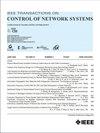又一个具有随机稳定性的自稳定最小顶点覆盖网络
IF 4
3区 计算机科学
Q2 AUTOMATION & CONTROL SYSTEMS
引用次数: 0
摘要
本文章由计算机程序翻译,如有差异,请以英文原文为准。
Yet Another Self-Stabilizing Minimum Vertex Cover of a Network With Stochastic Stability
The vertex covering of a network is one of the well-known combinatorial optimization problems, and the focal point in the perspective of autonomous intelligent systems is to achieve the optimal covering solutions with distributed local information by the nodes (individual systems) themselves. In this article, we utilize a potential game for the vertex cover problem, whose solutions to the minimum value of its global objective function are the minimum vertex covering states of a network, and newly propose a self-stabilizing-parallel-game-based (SPG) distributed algorithm for each vertex (player) to learn (update) its strategy parallelly with the local information. Under the proposed SPG algorithm, we prove that only the solutions to the minimum value of the potential game's global objective function are stochastically stable, and the covering strategies of all the players will converge with probability one to a stochastically stable state, which is beyond the general Nash equilibrium of vertex covering games in the literature. Furthermore, we estimate the convergence rate of the proposed SPG algorithm, and extensive samples with numerical examples verify the effectiveness and superiority of the proposed SPG algorithm on a variety of representative complex networks with different scales and standard benchmarks.
求助全文
通过发布文献求助,成功后即可免费获取论文全文。
去求助
来源期刊

IEEE Transactions on Control of Network Systems
Mathematics-Control and Optimization
CiteScore
7.80
自引率
7.10%
发文量
169
期刊介绍:
The IEEE Transactions on Control of Network Systems is committed to the timely publication of high-impact papers at the intersection of control systems and network science. In particular, the journal addresses research on the analysis, design and implementation of networked control systems, as well as control over networks. Relevant work includes the full spectrum from basic research on control systems to the design of engineering solutions for automatic control of, and over, networks. The topics covered by this journal include: Coordinated control and estimation over networks, Control and computation over sensor networks, Control under communication constraints, Control and performance analysis issues that arise in the dynamics of networks used in application areas such as communications, computers, transportation, manufacturing, Web ranking and aggregation, social networks, biology, power systems, economics, Synchronization of activities across a controlled network, Stability analysis of controlled networks, Analysis of networks as hybrid dynamical systems.
 求助内容:
求助内容: 应助结果提醒方式:
应助结果提醒方式:


